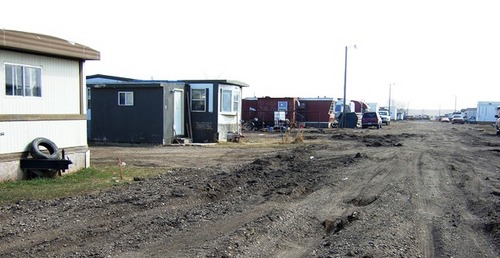March 31st, 2012

Residents of the Prairie Winds Trailer Court in New Town are being evicted to make way for housing for employees of an oil company. But many of the 45 trailers in the park are in poor condition and residents worry they can’t be moved. Photo from the website.
NEW TOWN — Residents of a 45-lot mobile home park in New Town, many among the poorest members of the Three Affiliated Tribes, are being evicted and will be replaced by oil workers.
Tribal leaders, who were offered a chance to buy the mobile home park, are working on a solution, but a severe housing shortage caused by the oil boom has the residents worried.
“There’s fear,” said resident Verdell Smith. “Where are we going to go? We’re here because there’s nowhere to go.”
The park is now owned by Future Housing LLC. John Reese, the agent for that organization, also is CEO and general manager of United Prairie Cooperative, formerly Cenex of New Town. United Prairie Cooperative plans to use the property to construct housing for its employees, Reese said.
Residents of Prairie Winds Trailer Park learned Nov. 22 the privately owned park had been sold and changes could be coming.
On Dec. 26, residents found letters taped to their doors stating they’d be receiving eviction notices.
Dennis Fox, CEO for the Three Affiliated Tribes, said the residents are some of the poorest members of the Mandan, Hidatsa and Arikara Nation.
“They’re not people with a lot of income,” Fox said. “They don’t have much choice in terms of where they live.”
Initially, the eviction deadline was set for May 1.
But because there are no available lots with sewer and water infrastructure, Fox and other leaders worked with Reese to extend the deadline to Aug. 31.
“He’s been very cooperative in that sense to give us extra time,” Fox said. “It’s just that we’re limited in areas for development because of the escalating cost of realty because of the oil impact.”
Wayne Stubstad owned the park for 31 years before deciding to retire. He said he first offered it to sell it to the tribe, but got no response.
“They didn’t show any real interest,” Stubstad said.
Fox said Stubstad asked for a “very high” price. He did not recall how much. The tribe does have oil revenue coming in, but there was not enough in the budget to purchase the property, Fox said.
Stubstad said he sold the property to Future Housing LLC for more than what he asked the tribe. He declined to say the price.
While residents were given more time to move, their rents are also going up.
Residents also were informed that monthly lot rent would become $200, which for some was an increase of $70 to $80. The rent increase was postponed until March 1 because Reese had not provided adequate notice.
Reese, who has worked for the New Town company for 35 years, said an out-of-state business likely would have evicted the residents in 30 days. The lot rent of $200 is low in the Oil Patch, where it often is $500 to $600, Reese said.
“We’ve done nothing but bend over backwards to try to accommodate them to give them extra time,” Reese said.
Prairie Winds residents say they feel like they’re being treated like second-class citizens. Shane Dye, who has lived in the park for nearly five years, said he would have preferred to have a meeting to talk about the changes rather than get a note taped to his door the day after Christmas.
“Just because we live in a trailer park doesn’t mean we’re trailer trash,” Dye said.
It’s unclear how many people live in the 45 trailers because many house two or three families due to the housing shortage.
Smith, a resident and spokesman for the group, estimates at least 90 adults and more than 90 children live in the park.
Edward Finley, who has lived in the park for seven years, has seven adults and five kids living in his trailer.
Forty of the trailers are occupied by tribal members. Some own the trailers and others rent.
Smith said the evictions remind him of the tribal members being displaced in the 1950s by the construction of Garrison Dam and the creation of Lake Sakakawea, which put hundreds of homes under water. New Town was founded for the displaced residents and is the largest city on the Fort Berthold Indian Reservation.
Tribal leaders have identified land east of New Town for possible development of a new mobile home park, Fox said.
“Hopefully we can get it all worked out by Aug. 31,” Fox said.
Meanwhile, residents have to figure out if their trailers can be moved. Many are dilapidated and tribal leaders hope they can be replaced with FEMA trailers.
“A lot of them are in tough shape,” Smith said.
Those with trailers that can be moved will have to figure out how to pay for it. Maggie Halvorson, who lives in a double-wide trailer with eight other people, said she’s received an estimate that it would cost $10,000 to move her trailer.
Stubstad said he has mixed feelings about selling the property.
“The oil field has changed stuff around here forever,” Stubstad said. “Ain’t never going to be the same. Some of it’s good. Some of it’s bad.”
Source: The Dickinson Press

Leave a Reply